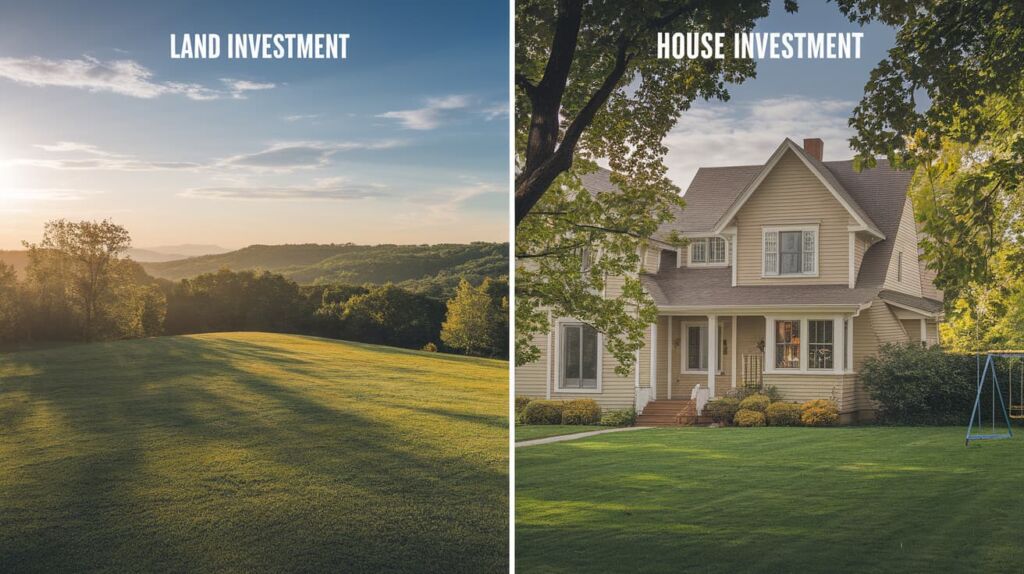When it comes to real estate investments, one of the biggest questions investors face is whether to put their money into land or a house. Both options have their advantages and challenges, making the decision highly dependent on financial goals, risk tolerance, and long-term strategies.
Investing in land can offer flexibility, lower maintenance costs, and potential for appreciation, while investing in a house provides immediate usability, rental income, and higher liquidity. Understanding the key differences between the two can help investors make an informed decision that aligns with their financial aspirations.
In this article, we’ll explore the pros and cons of investing in land versus a house, helping you determine which investment suits your needs best.
The Case for Investing in Land
Investing in land is often overlooked, but it can be a valuable addition to a diversified portfolio. Here’s why:
- Lower Purchase and Maintenance Costs – Compared to houses, land is generally cheaper to buy and requires minimal upkeep. There are no structures to repair, and maintenance is usually limited to property taxes and occasional landscaping.
- Appreciation Potential – Land values tend to rise over time, especially in developing areas where urban expansion is expected. As demand for land increases, prices can see significant appreciation.
- No Depreciation – Unlike houses, which deteriorate over time, land does not depreciate. It remains a valuable asset with potential for future development.
- Flexibility in Use – Land can be held as a long-term investment, used for agriculture, subdivided, or developed into commercial or residential properties. Investors have multiple exit strategies.
- Fewer Ownership Responsibilities – With no tenants, repairs, or rental agreements to manage, owning land requires far less effort than managing a residential property.
- Government Incentives – In some areas, governments provide tax breaks or incentives for conserving land, using it for agriculture, or engaging in sustainable development.
- Environmental Benefits – Open land can contribute to conservation efforts, carbon sequestration, or be used for renewable energy projects like solar farms.
However, investing in land also comes with its challenges. It typically does not generate immediate income unless leased for farming or commercial use. Additionally, selling land can take longer than selling a house since the demand for vacant land is often lower than for residential properties.
The Case for Investing in a House

Houses are a more traditional real estate investment choice, offering advantages that land investments do not. Here’s why investing in a house might be the better option:
- Immediate Income Generation – Unlike land, a house can be rented out immediately, providing a steady stream of income. Rental properties can yield high returns, especially in high-demand areas.
- Easier Financing Options – Banks and financial institutions are more likely to offer loans for houses than for vacant land. This makes it easier to leverage financing and grow a real estate portfolio.
- Stronger Market Demand – Houses tend to sell faster than land because they meet an immediate need for buyers—housing. The market for homes is generally more active, increasing liquidity for investors.
- Tax Benefits – Homeowners and real estate investors can take advantage of tax deductions on mortgage interest, property depreciation, and maintenance costs, reducing the overall tax burden.
- Potential for Appreciation and Forced Equity – While both land and houses appreciate, a house provides an additional advantage: investors can increase its value through renovations, improvements, and strategic upgrades.
- Multiple Investment Strategies – A house can be used as a rental property, vacation home, Airbnb, or flipped for profit, providing multiple revenue-generating opportunities.
- Leverage Opportunities – A house can be financed with a mortgage, allowing investors to use less upfront capital and benefit from property appreciation while only paying a portion of the cost upfront.
Despite these benefits, investing in a house also comes with risks. Houses require ongoing maintenance, repairs, and property management. Additionally, housing market fluctuations can impact property values, making timing crucial for buying and selling.
Comparing the Risks and Challenges

Both land and house investments come with their own risks, and understanding these can help investors choose the right option:
Risks of Investing in Land:
- Lack of Immediate Income – Unless leased for farming or business use, land does not generate regular cash flow.
- Longer Selling Time – It can take longer to find a buyer for land compared to a house.
- Development Costs – If the land is in an undeveloped area, adding infrastructure (roads, utilities, water) can be expensive.
- Zoning and Legal Restrictions – Some land may have restrictions that limit its potential use.
- Environmental Concerns – Land may have issues such as soil contamination, flood risk, or conservation restrictions that limit its usability.
- Financing Challenges – Securing a loan for raw land is more difficult than obtaining a mortgage for a house, requiring alternative financing options or larger down payments.
Risks of Investing in a House:
- High Maintenance Costs – Houses require ongoing repairs, upkeep, and property management.
- Market Volatility – Economic downturns and housing market fluctuations can affect property values and rental income.
- Tenant Issues – Renting out a house involves dealing with tenants, vacancies, and potential property damage.
- Mortgage and Debt Risks – Taking on a mortgage means financial obligations, and missing payments can lead to foreclosure.
- Property Depreciation – Unlike land, houses require upkeep to maintain their value, and some areas may experience declining property values over time.
- Insurance and Liability Costs – Houses require insurance coverage, and rental properties come with legal liabilities that landlords must manage.
While both types of investments come with their own risks, understanding these factors can help investors choose based on their financial situation and long-term goals.
Conclusion
Deciding between investing in land or a house depends on individual financial goals, investment strategy, and risk tolerance. If you’re looking for a lower-cost, low-maintenance investment with potential for long-term appreciation, land may be the right choice. However, if you want immediate cash flow, easier financing, and a higher resale demand, a house might be the better option.
Investors with a long-term vision and patience may find land to be an excellent asset, especially if purchased in an area with growth potential. On the other hand, those who prefer steady cash flow, leverage through financing, and active property management might lean toward houses.
Whether you choose land or residential property, it’s essential to understand the unique regulations and long-term costs that come with each option. For example, if you’re considering condos in Florida, this guide explains the state’s new condo reserve requirements and why reserve studies are critical to avoid unexpected expenses.
Ultimately, both investments can be profitable if approached with careful planning and market research. Investors should evaluate their goals, consider location factors, and weigh the risks before making a decision. Whether choosing land or a house, real estate remains a powerful tool for wealth-building and financial security. The best investment is the one that aligns with your financial strategy and future aspirations.
Ginis Garcia is a seasoned real estate investor with over 14 years of experience helping both new and experienced investors achieve their goals in the housing and land markets.
- Ginis Garcia
- Ginis Garcia
- Ginis Garcia
- Ginis Garcia


